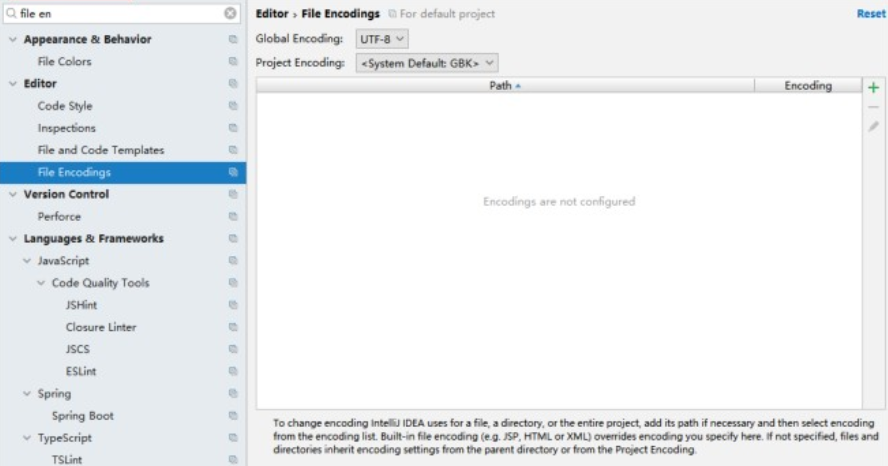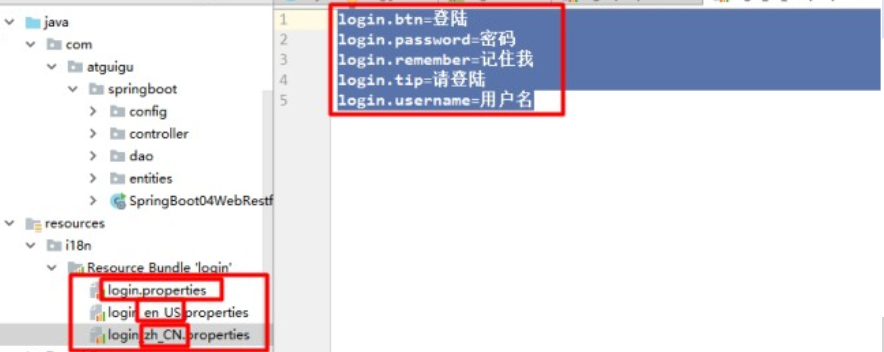SpringBoot——国际化
更多内容,前往 IT-BLOG
一、Spring 编写国际化时的步骤
【1】编写国际化配置文件;
【2】使用 ResourceBundleMessageSource 管理国际化资源文件;
【3】在页面使用 ftp:message 取出国际化内容;
二、SpringBoot编写国际化步骤
【1】创建 i18n目录,并创建 login.properties 国际化默认配置文件,同时创建 login_zh_CN.properties 系统就会自动识别到是配置国际化。就会切换到国际化视图,可以右键 Resource Bundle 'login'——Add——Add Propertie Files To Resource Bundle 快速添加其他国际化文件。
【2】可以通过视图的方式去添加国际化信息:
三、国际化原理
【1】进入 MessageSourceAutoConfiguration,发现 SpringBoot 自动配置好了管理国际化资源配置文件的组件;
1 @ConfigurationProperties(prefix = "spring.messages") 2 public class MessageSourceAutoConfiguration { 3 4 /** 5 * 以逗号分隔的基名列表(本质上是完全限定的类路径位置),每个都遵循ResourceBundle约定, 6 * 并对基于斜线的位置。如果它不包含包限定符(例如“org.mypackage”),它将从类路径根解析。 7 */ 8 private String basename = "messages"; 9 //我们的配置文件可以直接放在类路径下叫messages.properties; 10 11 @Bean 12 public MessageSource messageSource() { 13 ResourceBundleMessageSource messageSource = new ResourceBundleMessageSource(); 14 if (StringUtils.hasText(this.basename)) { 15 //设置国际化资源文件的基础名(去掉语言国家代码的) 16 messageSource.setBasenames(StringUtils.commaDelimitedListToStringArray( 17 StringUtils.trimAllWhitespace(this.basename))); 18 } 19 if (this.encoding != null) { 20 messageSource.setDefaultEncoding(this.encoding.name()); 21 } 22 messageSource.setFallbackToSystemLocale(this.fallbackToSystemLocale); 23 messageSource.setCacheSeconds(this.cacheSeconds); 24 messageSource.setAlwaysUseMessageFormat(this.alwaysUseMessageFormat); 25 return messageSource; 26 }
【2】如果有中文,需要设置编码格式
1 <span class="hljs-comment"># i18n目录下的login文件</span> 2 spring.messages.basename=i18n.login
【4】去页面获取国际化值(红色部分,国际化用#{})(链接用@{表示}绿色部分):效果:根据浏览器语言的设置切换国际化。
1 <!DOCTYPE html> 2 <html lang="en" xmlns:th="http://www.thymeleaf.org"> 3 <head> 4 <meta http‐equiv="Content‐Type" content="text/html; charset=UTF‐8"> 5 <meta name="viewport" content="width=device‐width, initial‐scale=1, shrink‐to‐fit=no"> 6 7 <meta name="description" content=""> 8 <meta name="author" content=""> 9 <title>Signin Template for Bootstrap</title> 10 <!‐‐ Bootstrap core CSS ‐‐> 11 <link href="asserts/css/bootstrap.min.css" th:href="@{/webjars/bootstrap/4.0.0/css/bootstrap.css}" rel="stylesheet"> 12 13 <!‐‐ Custom styles for this template ‐‐> 14 <link href="asserts/css/signin.css" th:href="@{/asserts/css/signin.css}"rel="stylesheet"> 15 </head> 16 <body class="text‐center"> 17 <form class="form‐signin" action="dashboard.html"> 18 <img class="mb‐4" th:src="@{/asserts/img/bootstrap‐solid.svg}" src="asserts/img/bootstrap‐solid.svg" alt="" width="72" height="72"> 19 <h1 class="h3 mb‐3 font‐weight‐normal" th:text="#{login.tip}">Please signin</h1> 20 <label class="sr‐only" th:text="#{login.username}">Username</label> 21 <input type="text" class="form‐control" placeholder="Username" th:placeholder="#{login.username}" required="" autofocus=""> 22 <label class="sr‐only" th:text="#{login.password}">Password</label> 23 <input type="password" class="form‐control" placeholder="Password" th:placeholder="#{login.password}" required=""> 24 25 <div class="checkbox mb‐3"> 26 <label> 27 <input type="checkbox" value="remember‐me"/> [[#{login.remember}]] 28 </label> 29 </div> 30 <button class="btn btn‐lg btn‐primary btn‐block" type="submit" th:text="#{login.btn}">Sign in</button> 31 <p class="mt‐5 mb‐3 text‐muted">© 2017‐2018</p> 32 <a class="btn btn‐sm" th:href="@{/index.html(l='zh_CN')}>中文</a> 33 <a class="btn btn‐sm" th:href="@{/index.html(l='en_US')}>English</a> 34 </form> 35 </body> 36 </html>
【5】浏览器切换,能够实现国际化的原理:国际化Locale(区域信息对象),LocaleResolver(获取区域信息对象)进入WebMvcAutoConfiguration类,SpringBoot 配置了默认的 localResolve,如下:
1 @Bean 2 @ConditionalOnMissingBean 3 @ConditionalOnProperty(prefix = "spring.mvc", name = "locale") 4 public LocaleResolver localeResolver() { 5 if (this.mvcProperties.getLocaleResolver() == WebMvcProperties.LocaleResolver.FIXED) { 6 return new FixedLocaleResolver(this.mvcProperties.getLocale()); 7 } 8 AcceptHeaderLocaleResolver localeResolver = new AcceptHeaderLocaleResolver(); 9 localeResolver.setDefaultLocale(this.mvcProperties.getLocale()); 10 return localeResolver; 11 }
【6】当点击页面 “中文” or “English” 时切换中英文,页面参照4)信息。这是我们需要自己写一个 Locale,并加入容器中。
1 /** 2 * 可以在连接上携带区域信息 3 */ 4 public class MyLocaleResolver implements LocaleResolver { 5 6 @Override 7 public Locale resolveLocale(HttpServletRequest request) { 8 String l = request.getParameter("l"); 9 Locale locale = Locale.getDefault(); 10 if(!StringUtils.isEmpty(l)){ 11 String[] split = l.split("_"); 12 locale = new Locale(split[0],split[1]); 13 } 14 return locale; 15 } 16 @Override 17 public void setLocale(HttpServletRequest request, HttpServletResponse response, Locale locale) { 18 } 19 }
【7】将自己写的类,加入到 IOC容器中,方法的名字必须是 localeResolver,相当于 bean 的 id。以为默认的 localeResolver会判断容器中是否已经存在了 localeResolver。
1 @Bean 2 public LocaleResolver localeResolver(){ 3 return new MyLocaleResolver(); 4 }






 浙公网安备 33010602011771号
浙公网安备 33010602011771号